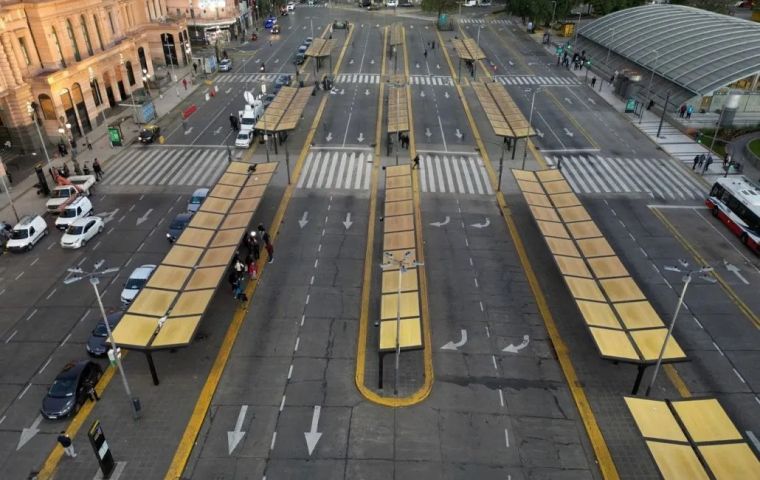MercoPress. South Atlantic News Agency
Thursday's strike, a wake-up call to the Argentine authorities, CGT claims
 The government needs to change course or more general strikes will be called for, Daer warned
The government needs to change course or more general strikes will be called for, Daer warned After Thursday's general strike, Argentina's General Labor Confederation (CGT) said the measure should be as a “wake-up call to the authorities” who “must take note” of the scenario ahead. CGT co-leader Héctor Daer also mentioned that “we take note of the support” of the workers who have suffered a hefty wage reduction since President Javier Milei took office on Dec. 10, 2023.
Expressed in US dollars, salaries may be higher but their purchasing power certainly is below the one they had under Alberto Fernández despite the country's rampant inflation. Hence, the CGT insisted that the strike reflected widespread discontent with the current economic situation and stressed the need for the government to reevaluate its strategy because the measure was not an end in itself but only a warning for the government to change course given the numerous “sectors of the citizenry that will hardly be able to recover if this continues,” Daer explained.
During a press conference at the CGT headquarters on Azopardo Street in Buenos Aires, Pablo Moyano, another of the triumvirs heading the labor guild, downplayed the government's criticism and warned there could be “greater conflict” if the Libertarian administration remains on this path.
According to CGT figures, 90% of the country's teachers and 80% of the petrol stations joined the stoppage. “I would like to congratulate all the workers of the Argentine Republic who have shown that the agenda that led us to this strike had the social and, above all, political support to be carried out,” Daer stressed.
“For those who say that this is a political strike, we say that, effectively, we are discussing the course of this country, the policy that is being carried out, all the actions that damage the social framework of the country,” he added.
In Daer's view, the strike's “success has to do with the fact that the workers have supported the idea of paralyzing the activities to make a claim” regarding wage improvements and the homologation of pay agreements already signed.
Daer also stressed that the lower house's approval of the so-called omnibus bill shows that lawmakers “have never finished understanding the suffering of the Argentine people,” and warned that if the bill is passed by the Senate those working for companies with five or fewer employees would be placed under a legal regime of informality. He also announced several meetings in the coming days with some prominent Senators to persuade them to vote against Milei's project. The union leader also insisted that the President's emergency decree (DNU) 70/23 liberalizing the economy needed to be repealed in Congress.
Otherwise, further strikes would be called for given the “resounding” drop in industrial and construction activities according to the latest National Institute of Statistics and Census (Indec) report of -21.2% and -42.2% respectively in March alone. “These are jobs and quality of life for Argentines that are lost,” Daer stressed.




Top Comments
Disclaimer & comment rulesCommenting for this story is now closed.
If you have a Facebook account, become a fan and comment on our Facebook Page!